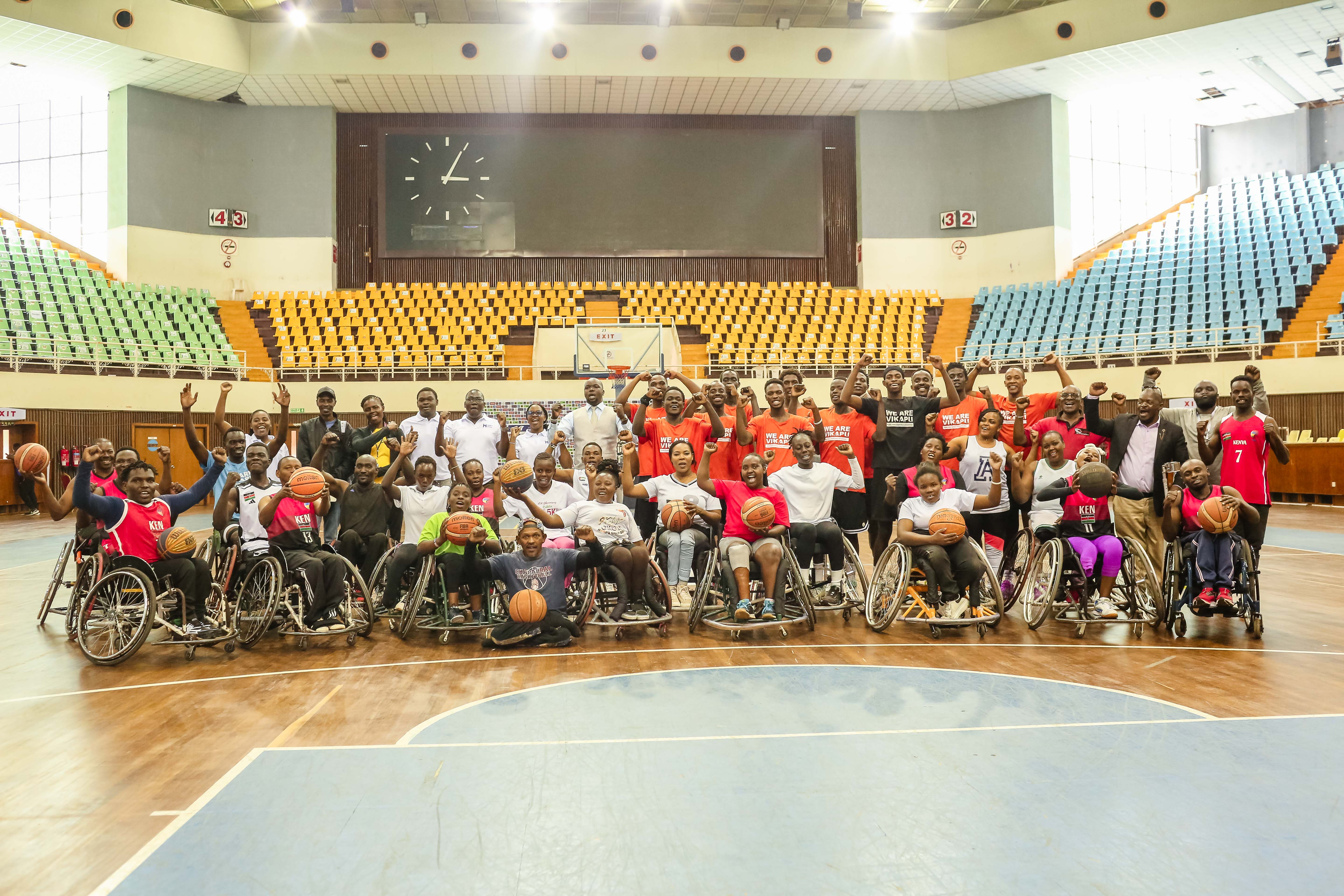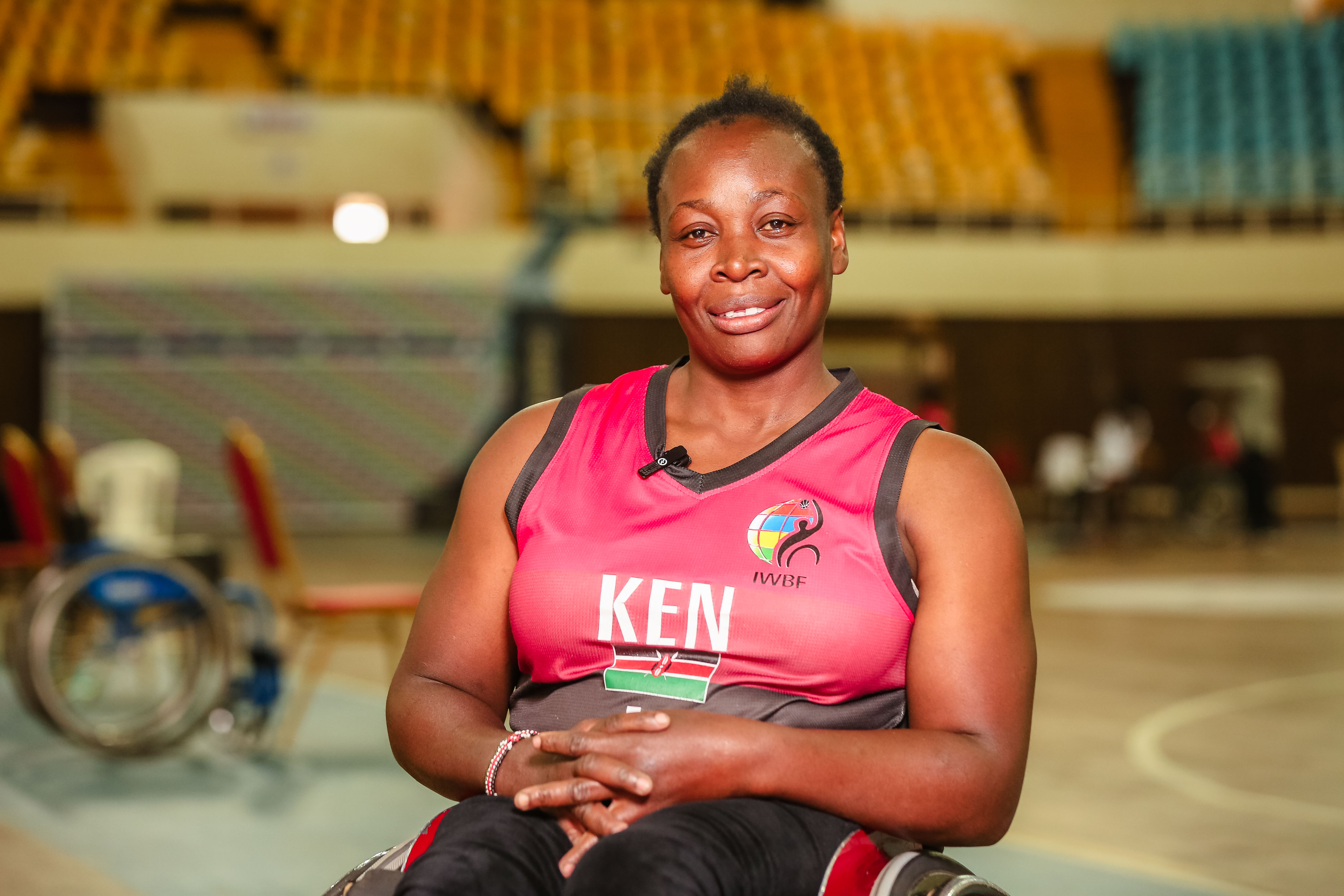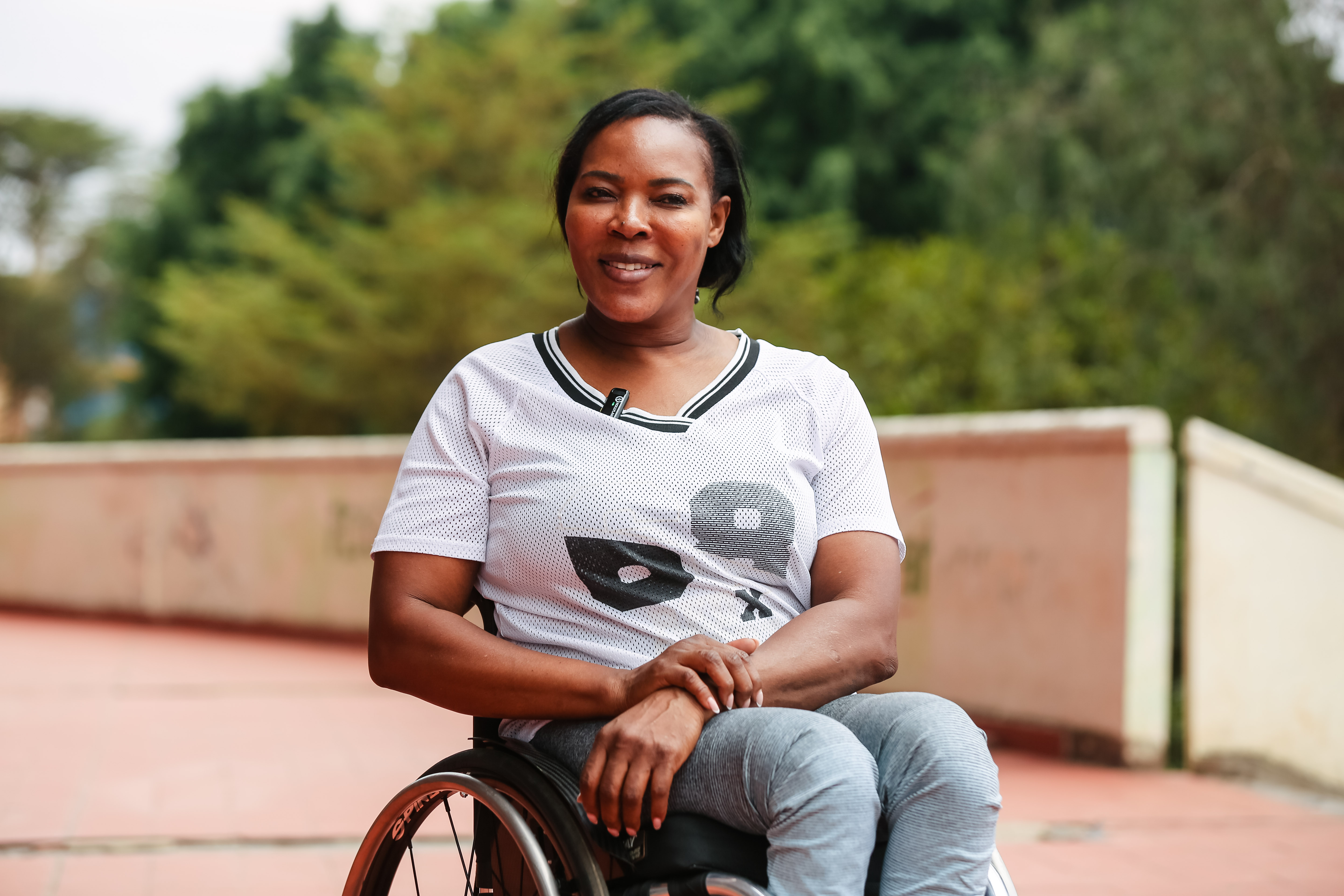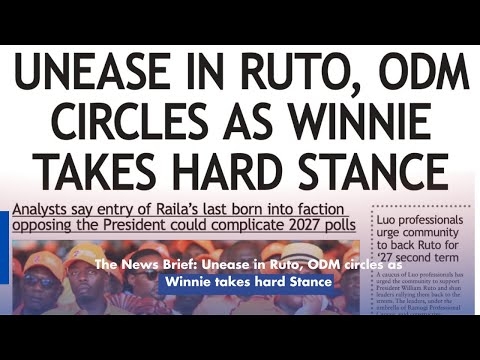 Members of the Kenya Wheelchair Basketball team in a training camp with Vikapu Basketball team at the Kasarani Arena.
Members of the Kenya Wheelchair Basketball team in a training camp with Vikapu Basketball team at the Kasarani Arena.
For decades, the poliovirus has
not just crippled bodies—it has left indelible marks on hearts, daily routines,
dreams and entire communities.
Anne Wafula Strike, a 56-year-old Kenyan-born British, is a polio survivor, a paralympian and a disability rights and inclusion advocate.
She has been compelled to start an initiative geared towards creating awareness on the importance of polio immunisation as she empowers other polio survivors through sports.
Anne says she started the advocacy in 2000, but it gained momentum in 2006 when she moved to the UK, which gave her a bigger platform to champion the rights of people living with
disability.
She was motivated to start the programme by the challenges she experienced as a polio survivor while living in Kenya, where people with disability report being ostracised.
"As a polio survivor myself, I saw the challenges faced
by people living with physical disabilities, especially those caused by
polio," she explained. "Sports gave me not just physical strength but
also confidence, social inclusion and mental stability. I wanted to share that
transformative power with others like me, to show them that polio is not the
end of their potential,” she added.
Joyce Ambasa, a 42-year-old polio survivor and mother, has been a beneficiary of Anne’s initiative, and intends to use the sport to also spread vaccination awareness. She is a member and player in the Kenya wheelchair basketball federation.
She talks about her journey, having been infected with polio when she was two years old.
 Joyce Ambasa, a player and a member of the Kenya Wheelchair Basketball Federation.
Joyce Ambasa, a player and a member of the Kenya Wheelchair Basketball Federation.
“I got polio when I was two years old and it has been tough
for me living among people with functional limbs. My school life was difficult
as I had to be carried by my father to and from school every day.”
She says that joining the Kenya Wheelchair Basketball team has been of immense help to her. She narrates the painful ordeal of getting employment in Kenya as a person with disability.
She says: “Getting a job in Kenya
as a person with disability is quite difficult. This federation gives me a
chance for employment since I can play for the team and earn an
allowance that helps me to pay my bills.”
According to Anne, participating in sports has been life-changing on multiple fronts. Mentally, Anne says it cultivated a sense of independence and breaking limitations. Physically, it strengthened her body against the aftereffects of polio, improving mobility and stamina.
Socially,
sports opened doors to community acceptance and meaningful friendships that often elude persons with disabilities. "It’s not just about winning medals," Anne
shared, "it’s about changing mindsets and breaking barriers that society
imposes on us."
The multiple benefits as shared by Anne are confirmed by Joyce. She confirms that indeed participating in sports as a person with disability has many advantages. She says: “Other than the allowances I get, playing has really helped me to be active, which has given me Stamina to ride the wheelchair as I move around and also to stay healthy because running around keeps my body active.”
 Anne Wafula Strike, a paralympian, disability rights and
inclusion advocate and polio survivor.
Anne Wafula Strike, a paralympian, disability rights and
inclusion advocate and polio survivor.
Afred Simiyu Barasa, a 54-year-old polio survivor and
president of the Kenya
Wheelchair Basketball Federation, narrates his ordeal as a polio survivor. Just
like Joyce, he also contracted polio at two years, as he was told by his
parents.
Unlike Joyce, he received his polio vaccine when he was already infected with the virus; hence, it did not have any effect.
He notes that polio is a stigmatising disease as
it makes survivors who are paralysed view themselves as less human.
“Many
people, including family members, treat people affected with polio differently. Most
people, especially in the rural areas, have left people with disabilities to act
as home guards. They are not allowed to go anywhere because the families want
to preserve their status in society.”
Alfred says
that wheelchair basketball is like a rehabilitation activity. It helps turn
people who would otherwise suffer from stigma and boring lifestyle into vibrant
and energetic humans who can fend for themselves.
“Starting
this sporting activity in the late 90s, we did not fathom the incredible impact
it was going to have on the participants. Joining hands together with
passionate people like Anne Wafula in supporting disabled people to regain
their full potential in life and also create awareness to prevent further polio
infections is in itself reassuring,” says Alfred.
Anne recounts one memorable moment that reinforced her
dedication to this cause. She witnessed the joy and determination of
young polio survivors engaging in sports activities organised through her
initiatives.
"Seeing a child who once thought their disability meant
a limited future now running, laughing, and dreaming big is a priceless moment.
They reaffirm that what we are doing matters and it truly changes lives,"
she said.
She is equally passionate about her advocacy for
immunisation, stressing a clear message for parents and policymakers.
"Polio is a disease we can prevent entirely with vaccines. I urge parents
to immunise their children fully and consistently. For policymakers, the
message is clear: we must prioritise funding, education and infrastructure to
reach every vulnerable child. Complacency is the enemy because we are almost
there—close to eradicating polio—but we must push harder to cross the finish
line,” she notes.
Anne believes in a collective
and multifaceted approach from everyone to eliminate polio. She says, "Kenya and the world
need to improve surveillance, enhance community engagement to combat
misinformation and ensure vaccines reach even the remotest areas. We cannot
afford to backslide. Protecting vulnerable populations means looking at health,
education and social support systems collectively and efficiently.”
She calls on the government and parents to fast-track the
uptake of polio vaccines. She says the government must ensure that
the vaccines are available, while parents should avail their children for vaccination.
Alfred calls on the government to fund such
sporting activities to reach as many polio patients in the country as
possible, to also help them realise their dream. He says this sport will make
them active and give them stamina to take care of themselves.
Looking ahead, Anne shares a hopeful vision for Kenya’s children, especially those facing polio-related challenges. "I envision a Kenya where every child with a disability has access to not only health services but also opportunities to thrive through education, sports and community support. I want young kids to see role models like me and know their condition does not define their destiny. This vision requires collective effort, but it’s achievable.”
Kenya has not reported any cases of wild poliovirus (WPV) since 2013, when the last outbreak occurred. That outbreak was imported from Somalia and affected the Dadaab refugee camp in Garissa County. The country is officially classified as wild poliovirus-free, consistent with the WHO Africa Region's certification of WPV eradication in August 2020.
However, the main threat now comes from vaccine-derived polioviruses (especially cVDPV2), which continue to circulate in some parts of Kenya due to gaps in immunisation coverage. These mutated viruses can emerge in under-immunised communities when the weakened virus used in oral polio vaccines mutates and regains virulence.
In 2024, Kenya reported five further cVDPV2 cases, primarily among children in the Kakuma Refugee Camp, and an environmental positive sample in Nairobi’s Kamukunji area.
Routine
immunisation in Kenya achieves roughly 91 per cent polio vaccine coverage, but
rates dip as low as about 77 per cent in northeastern regions, often near
refugee camps and areas of low sanitation, according to the Ministry of Health.
















